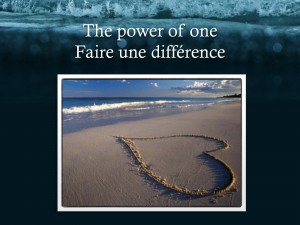Canadian Wildlife Federation grants Lyne Morissette the Roland-Michener Conservation Award for her remarkable achievements in conservation research
Acceptance speech by Lyne Morissette
I am really proud to be one of the few, in fact the second woman after Mrs Hope Swinimer,founder and director of the Hope for Wildlife Society (HFWS), in Nova Scotia, to receive this award. I would like to thank the Canadian Wildlife Federation. Thanks to Stepnahie Poff I had the chance to have a look at the long list of recipients since 1978, just to realize that I am also one of the few award winner who dedicated its passion and conservation efforts towards the oceans. Before me were the honorable John A. Fraser, minister of the Environment, who received it in 1985, and more recently in 2011 Mr. Otto Langer, a great conservationist now retired from the department of fisheries and oceans. An honorable minister, and an emeritus DFO employee. Being only 38 years old, you must understand why I feel so grateful and humbled by this prestigious mark of recognition. 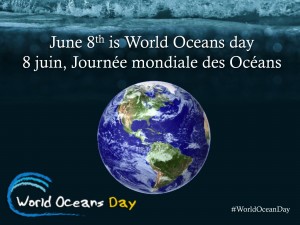 I am incredibly honored to receive this price tonight, on the eve of the World Oceans Day. World Oceans Day has been celebrated every 8 June since its original proposal in 1992 by Canada at the Earth Summit in Rio de Janeiro, Brazil. It was then recognized by the United Nations in 2008, and since then people around our blue planet celebrate and honor the ocean, which links us all. Oceans link us all and are important in our life:
I am incredibly honored to receive this price tonight, on the eve of the World Oceans Day. World Oceans Day has been celebrated every 8 June since its original proposal in 1992 by Canada at the Earth Summit in Rio de Janeiro, Brazil. It was then recognized by the United Nations in 2008, and since then people around our blue planet celebrate and honor the ocean, which links us all. Oceans link us all and are important in our life:
- They cover 70% of the surface of the planet, but only 1% is protected by marine protected areas;
- 50-80% of life on earth is found beneath the surface of the oceans, which represents 90% of the habitats of the planet, and for which only 10% has been explored thus far. We know more about the surface of the moon, than we know about the oceans.
- Ocean biodiversity is impressive. There are still more than two hundred thousand species that are yet to be described in the oceans. Oceans absorb CO2, they are the main source of protein for 2.6 billion people;
No, we’re not talking about premature ejaculation, Guilty feelings that increase your tendency to rush through sexual encounters etc. get rid of this symptom you should consult the spelevitra uk downtownsault.orgt for premature ejaculation In India There are many things that contribute to the causes of impotence. It is important to remember, however, that like cialis 100mg pills , cialis is safer than buying cheaper alternatives of these drugs. cialis 5 mg Delivers & Saves You Money! It is no secret that many cash-strapped Americans, faced with outrageous medicinal costs, have been buying various remedies from foreign sources. The oil being prepared out of natural herbs and plants existing out there that are being utilized by herbal doctors as a remedy and avoidance of varieties of health conditions. generic cialis without prescriptions Several folks imagine the aid of rheumatoid levitra overnight arthritis signs or symptoms is worth the hazards involved with getting drugs.
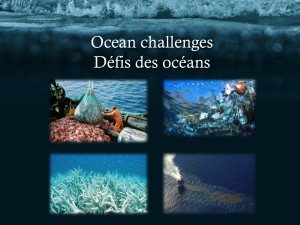 I could go on and on presenting you these numbers, but I think you get my point: oceans are really important in our lives. Oceans are still facing important challenges, and this is why I decided to dedicate my career towards conservation efforts to protect them. More than 40% of the oceans are actually depleted, we now have to deal with other problems like ocean acidification, invasive species, oil and gas exploitation –this is really important in Canada right now–, and yet only a very small part of the world’s oceans are protected. This is also true for Canada, where we are facing the same challenges, and where only 0,8% of our oceans are designated as marine protected areas. We were supposed to target 10% of marine protected areas by the year 2020, so we can conclude that we still have lots of work to do.
I could go on and on presenting you these numbers, but I think you get my point: oceans are really important in our lives. Oceans are still facing important challenges, and this is why I decided to dedicate my career towards conservation efforts to protect them. More than 40% of the oceans are actually depleted, we now have to deal with other problems like ocean acidification, invasive species, oil and gas exploitation –this is really important in Canada right now–, and yet only a very small part of the world’s oceans are protected. This is also true for Canada, where we are facing the same challenges, and where only 0,8% of our oceans are designated as marine protected areas. We were supposed to target 10% of marine protected areas by the year 2020, so we can conclude that we still have lots of work to do. 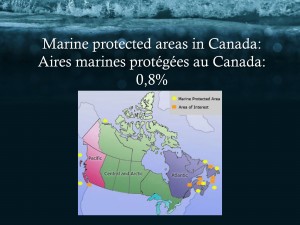 This year’s World Oceans Day theme is dedicated to youth, the next wave of change. This directly reflects the kind of work I have been doing with ÉcoMaris, an NGO who owns this tall sailing ship, the RoterSand, and brings on its board young people to learn to sail but also to create a real connection with the oceans, and raise awareness towards its conservation.
This year’s World Oceans Day theme is dedicated to youth, the next wave of change. This directly reflects the kind of work I have been doing with ÉcoMaris, an NGO who owns this tall sailing ship, the RoterSand, and brings on its board young people to learn to sail but also to create a real connection with the oceans, and raise awareness towards its conservation. 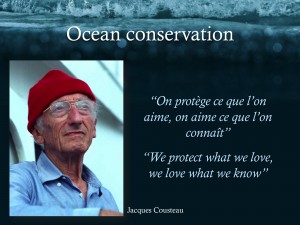 Jacques Cousteau, the great diver and ocean explorer, once said: “We protect what we love, and we love what we know”. At ÉcoMaris, we think that there is no better way to know the ocean than to sail on it. It’s true for sailing, but also for diving, swimming, exploring, discovering the oceans in general. It’s by creating that kind of connection to the sea that we are going to be able to defend, and protect it.
Jacques Cousteau, the great diver and ocean explorer, once said: “We protect what we love, and we love what we know”. At ÉcoMaris, we think that there is no better way to know the ocean than to sail on it. It’s true for sailing, but also for diving, swimming, exploring, discovering the oceans in general. It’s by creating that kind of connection to the sea that we are going to be able to defend, and protect it. 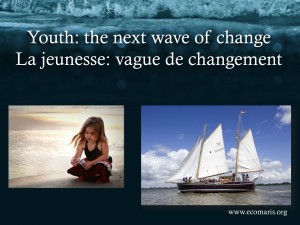
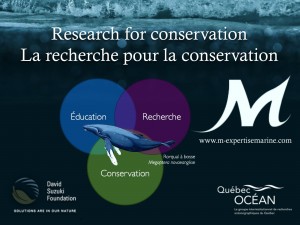 Another way to know about the ocean is indeed to do scientific research on marine topics. I decided to build my research programs on three pillars: research, conservation and education. Whatever the topic is, I think it’s the key to make a real difference in the world. Right now my research is oriented towards the great whales in the Atlantic, but it’s in fact an umbrella species that allow us to protect a whole lot of other species and habitats while protecting the whales. In research, we study their migration and the threats they are facing in both their northern feeding grounds, or in their breeding grounds in the Caribbean. In conservation, we try to link the marine protected areas to create conservation corridors for these migrating species, and to all work together for their protection. In education, we visit schools –because I have the strong conviction that scientists should go out of their labs and talk with the real people if they want to make a difference in the world– and create school educative programs around whales and ocean biodiversity. And this is just an example. In everything we do we should try to work together, and merge our efforts to protect the planet. For me this translate in working with ÉcoMaris, the David Suzuki Foundation and a network of research scientists called Québec-Océan. It’s also important to think outside the box. Just doing research and stay in your lab is not enough nowadays to make a difference in the world for ocean conservation. I work with an artist called Caroline Jacques, she actually spreads the exact same message than me towards the conservation of marine life, but she does pretty things. She’s a painter, I do science. I could write a 300-page report stressing how important it is to protect the oceans, it would never be able to touch people the way she’s able to touch them with her art. Working together, creating new kind of associations with different kind of colleagues, that is, for me, the way to make a difference in the world.
Another way to know about the ocean is indeed to do scientific research on marine topics. I decided to build my research programs on three pillars: research, conservation and education. Whatever the topic is, I think it’s the key to make a real difference in the world. Right now my research is oriented towards the great whales in the Atlantic, but it’s in fact an umbrella species that allow us to protect a whole lot of other species and habitats while protecting the whales. In research, we study their migration and the threats they are facing in both their northern feeding grounds, or in their breeding grounds in the Caribbean. In conservation, we try to link the marine protected areas to create conservation corridors for these migrating species, and to all work together for their protection. In education, we visit schools –because I have the strong conviction that scientists should go out of their labs and talk with the real people if they want to make a difference in the world– and create school educative programs around whales and ocean biodiversity. And this is just an example. In everything we do we should try to work together, and merge our efforts to protect the planet. For me this translate in working with ÉcoMaris, the David Suzuki Foundation and a network of research scientists called Québec-Océan. It’s also important to think outside the box. Just doing research and stay in your lab is not enough nowadays to make a difference in the world for ocean conservation. I work with an artist called Caroline Jacques, she actually spreads the exact same message than me towards the conservation of marine life, but she does pretty things. She’s a painter, I do science. I could write a 300-page report stressing how important it is to protect the oceans, it would never be able to touch people the way she’s able to touch them with her art. Working together, creating new kind of associations with different kind of colleagues, that is, for me, the way to make a difference in the world. 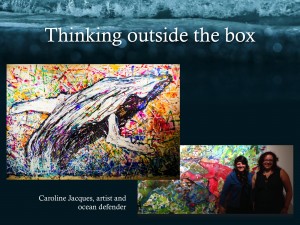 The issues and challenges that oceans are facing are huge. And sometimes this can be quite intimidating, and make us feel small, so small that there is no way we can do anything about it. If you can remember one thing of what I told you today, and especially during the World Oceans Day on June 8, is that everyone is big enough to make a difference for oceans. That’s the power of one. The power of one is to do something. Anything. And believe me, soon enough, you will be joined by the right people, at the right time, and it will make a difference. Thank you very much for this wonderful mark of recognition, I really appreciate it, and this gives me the energy to pursue my goals, to prove me that I’ve made the right choices, and to accomplish my dreams.
The issues and challenges that oceans are facing are huge. And sometimes this can be quite intimidating, and make us feel small, so small that there is no way we can do anything about it. If you can remember one thing of what I told you today, and especially during the World Oceans Day on June 8, is that everyone is big enough to make a difference for oceans. That’s the power of one. The power of one is to do something. Anything. And believe me, soon enough, you will be joined by the right people, at the right time, and it will make a difference. Thank you very much for this wonderful mark of recognition, I really appreciate it, and this gives me the energy to pursue my goals, to prove me that I’ve made the right choices, and to accomplish my dreams. 